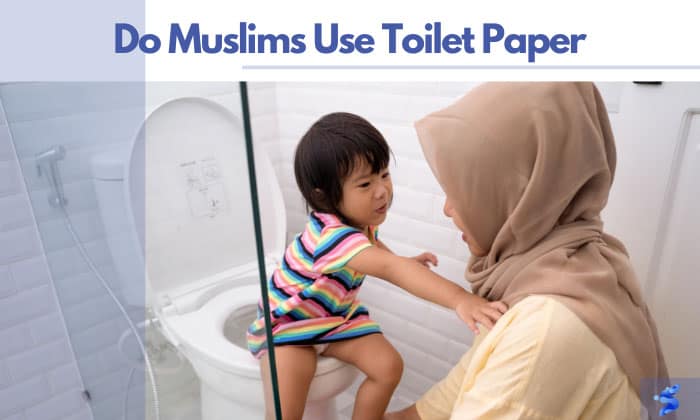Welcome to our intriguing exploration of the question: “Do Muslims use toilet paper?” In this article, we aim to dispel misconceptions and shed light on the diverse hygiene practices followed by Muslims worldwide.
Regarding Muslim toilet wash, they mostly use water as a way to clean their private parts after using the toilet. Only when water isn’t available do Muslims opt for toilet paper.
Join us on this enlightening journey to better understand Muslim hygiene habits and the various methods employed for maintaining cleanliness in the bathroom!
Table of Contents
The Rules for the Toilet
Muslim bathroom etiquette encompasses guidelines and practices emphasizing cleanliness, mindfulness, and religious observance. Understanding these rules provides insights into their cultures, particularly regarding the religious significance Muslims attribute to personal hygiene while using the toilet.
- Recite the Dua before entering the toilet.
- Step into the toilet with your left foot. Your back should be facing the direction toward the Kaaba.
- Maintain silence and refrain from consuming any food while using the toilet.
- Once the person is done defecating or urinating, use the left hand, water, and soap to clean the private part.
Alternatively, the person may wipe themselves clean with an odd number of smooth stones or tissues using their left hand. Muslim left hand wipe practice explains why they only use their right hands to eat.
- Upon leaving the toilet, exit with the right foot and express gratitude to Allah through prayer for relief from filth.
Why Don’t Muslims Use Toilet Paper?
The decision to use toilet paper or water primarily depends on personal habits and cultural practices. The Islamic and Muslim’s guide emphasizes cleanliness and the removal of impurities, regardless of the method employed. Using tissues, papers, or similar materials is considered adequate as long as they effectively clean the area.
However, Muslims are encouraged to clean their private parts using soap and water to remove impurities. The preference for water primarily stemmed from the Sunnah (traditions and practices) of the Prophet Muhammad, who advocated the use of water for purification.
This practice is still followed by the majority of Muslims around the world, especially in regions where water sprays are commonly available in bathrooms. The advent of portable bidets also helps, as they are small enough to fit into a standard pocket. Before that, practitioners used to rely on the Lota Muslim—a hand-held shower head.
However, when water is not available, Muslims may use toilet paper as a practical alternative, as long as they stick to an odd number. Although no longer common, they may also use stones, known as istijmaar, for purification after using the bathroom. Again, an even number is prohibited.
So if you think “Islam” is the answer to “what religion does not allow toilet paper”, you’re off the mark. To be clear, the religion does not forbid its practitioners from using toilet paper; it only encourages Muslims to use water and soap instead.
How to Clean Yourself After Using the Toilet in Islam?
How do Muslims wipe their private parts? Well, there are three permissible ways to cleanse oneself, according to Islamic toilet rules.
- The first method is using water, which is considered the best way. After doing number 2, Muslim are encouraged to clean with the addition of soap as well.
To follow this perfect cleaning method, practitioners usually bring a Lota with them. For convenience’s sake, some Muslims prefer the portable bidet, which features a plastic bottle and a detachable nozzle.
- The second method is istijmaar, which involves using stones or leaves to remove impurities.
In this case, the recommended number of stones and leaves to use is three. The follower should wipe in such a way that no trace of excrement is left behind.
- The third method is a combination of using stones followed by water.
It is emphasized that one should not use the absence of water as an excuse to delay prayers, as tissues or other suitable materials can be used, or efforts can be made to bring water to the toilet for cleansing.
Regardless of what method you pick, remember that the number of wipes should always be odd. In addition, you must wipe with your left hand only, as Muslims have a strict rule stating: wipe with left hand eat with right.
Last but not least, after wiping themselves clean, Islamic followers must wash their hands thoroughly, preferably with water and soap.
What’s More Hygienic: Water or Toilet Paper?
Regarding hygiene, researchers have a growing consensus that water is a superior cleansing agent compared to toilet paper.
The delicate and thin skin around the buttocks is susceptible to injuries when wiped with dry tissue paper, which can be harsh and irritating. In contrast, a bidet toilet offers a more comfortable and convenient alternative.
Scientific studies indicate that washing with water is not only more effective at removing impurities, but it also eliminates a greater number of germs and bacteria compared to using toilet paper.
Therefore, in terms of hygiene, the water emerges as the more hygienic option, providing a thorough and long-lasting cleaning for better personal well-being.
So, wash vs wipe? The answer is clear.
Frequently Asked Questions
Countries that don’t use toilet paper?
Residents of European countries such as France, Portugal, Italy, Japan, Argentina, Venezuela, and Spain commonly opt for bidets as an alternative to toilet paper.
Additionally, Middle Easterners do not use toilet paper that often due to religious reasons explained above.
And in certain indigenous communities and remote areas like the Somalis, traditional practices may involve alternative cleansing methods, such as using natural materials like leaves, corn cobs, or washable cloths.
Do Muslims use public toilets?
Yes, Muslims in Arabs and other countries do use public toilets as it is not forbidden, though most people use public restrooms in emergencies only.
One reason for their avoidance of public restrooms is that it’s harder for them to follow the wuzu – the practice of ritual washing. In addition, the requirements for Muslim female hygiene while they’re on a period mean that it’s harder for them to clean themselves when in a public restroom during this time of the month.
Conclusion
To summarize the answer to “do Muslims use toilet paper?”, I’d once again state that they do, but only when in emergencies.
Understanding and respecting these variations fosters a greater appreciation for the cultural nuances that shape our global community. By embracing knowledge and open-mindedness, we can break stereotypes and bridge cultural gaps, promoting a more inclusive and understanding society.

I’m Paulk Webb, and I work as a writer for Saveourwaterrebates. I’m happy to put in the time and effort to conduct market research to identify the most pressing issues faced by households concerning their plumbing. Feel free to check out our guides to get the most informed recommendations for how to solve your problems.







